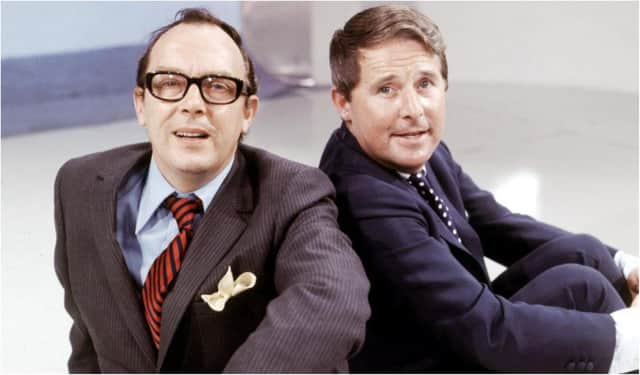End of broadcast TV as we know it? Eric Morecambe would have just one thing to say about that – Aidan Smith


Just over 29 million people in the UK watched Queen Elizabeth’s funeral in September, a figure spread across many networks including, quaintly, a major subscription sports channel. In 1977, though, the mighty comedy duo could only be seen on BBC1 so the 28 million who laughed along to their sending-up of Elton John, Penelope Keith and the assorted newsreaders they dressed as sailors for a cartwheeling musical sketch in that year’s Christmas spectacular is the far more impressive total.
It was exactly half the country, our population having increased from 56 million 45 years ago to the current 67 million. I’ve always been fascinated by that 50-50 split – a straight cut down the middle of the Christmas cake – and wondered what the hell the rest who didn’t watch were doing instead.
Advertisement
Hide AdAdvertisement
Hide AdBut this, in the very near future, will be a question for the historians as we appear to be heading towards the day when there is no more broadcast TV. Instead, all output will be available online only. No more schedules. No more event viewing. And no more gathering round what used to be called the cathode-ray tube, dad in his favourite armchair, mum multi-tasking with a mixing bowl or holey socks in need of darning and the kids sat on the rug next to the sleeping hound, a classic image used many times on the cover of Radio Times.
And hang on… the double Christmas issue will be here any day now. What will be the point of the listings mag when there’s no need to navigate your way round the chosen running order, circling the programmes you want to watch?
Do we like this? “What do you think of it so far?” as Ernie would enquire. To which Eric would reply: “Rubbish!”
This vision of how we will view comes from the Beeb. “Imagine a world that is internet-only, where broadcast TV and radio are switched off and choice is infinite,” says director-general Tim Davie. He promises this will – “and should” – happen.
Choice is already close to infinite. There is almost too much TV. No one has the time – or even the inclination – to watch every high-end drama or searing documentary. We are encouraged to be our own schedulers, to watch what we want, when we want – to play fast and loose with the pre-ordained timetable and even ignore it completely. But I quite like the national broadcaster putting programmes in places where I can find them, where it thinks I’ll enjoy them, and for instance, Have I Got News for You at 9pm on Fridays when the week’s work is done is perfect.
I’m probably showing my age here. If you were brought up on Watch with Mother then the Beeb is Auntie. You’ve grown accustomed to her paternalistic, prescribed ways. Inform, educate, entertain. These are the principles of the BBC. Not every broadcaster shares them, or would place them in that order. How would the shows which inform and educate fare if TV became a giant toyshop which throws open its doors and makes everything available all at once? Would most of us not just grab only the glittery, the undemanding, the stuff that makes us laugh because that’s what we need?
Take Simon Schama’s History of Now, which finished on Sunday. It was put in a primetime slot which wouldn’t exist in the new world (dis-)order. It was never going to top the ratings but this was one of those series, presented by the kind of venerable telly historian who’s almost become extinct, where you took the BBC on trust that you might learn something. The televisual equivalent of being advised to eat your greens.
Haven’t we had our fill of boxset TV, gorged on enough shows where entire runs are wolfed down in one or two sittings? For, viewed that way, are they properly appreciated? Not really.
Advertisement
Hide AdAdvertisement
Hide AdOne of the dramas of the year ended last night. The White Lotus gripped viewers with its black comedy, sexual tension and the opportunity to smirk at unhappy rich folk because of the great scripts and the great acting but also because Sky Atlantic stayed in control of how and when we watched, which was a single, delicious instalment every Monday.
As a result, fans of the show could speculate, theorise and above all savour the show in feverish debates on social media. The White Lotus revived the tradition of watercooler TV, even if actual watercoolers don’t figure anymore because of WFH.
Can we go back to weekly episodes, please? And can we retain some sort of scheduling? Master of what I watch is not a role I ever sought for myself – I don’t want to play God. I am happy every now and again for the BBC to tell me what’s good for me. Sometimes Auntie will get it wrong but other times she will surprise me, and I will surprise myself by enjoying a show which could easily have passed me by. The risks of that will only heighten in the new frontier of “infinite choice”.
But then I’m the age I am, who watched with mother and then, because there used to be so little choice on two or three channels, and not very much at all for adolescents, who watched with father. Grown-up programmes I thought were going to be dead boring but weren’t. And some were absolutely hilarious. If we’d opened our front door during that “Nothing Like a Dame” sketch and neighbours had done the same, the laughter would have echoed right down the street.
Comments
Want to join the conversation? Please or to comment on this article.